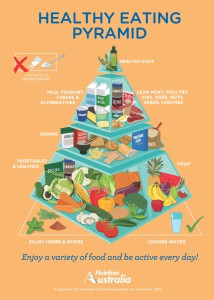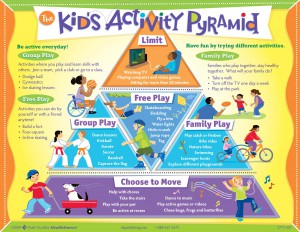At Gosnells Primary School we value learning and recognise that children learn best when they are healthy and happy. In the school environment healthy bodies and healthy minds are achieved by staff, families and children working together by teaching children how to eat healthily, exercise regularly and develop a sense of well-being, confidence and self-esteem. This will give them the best possible chance to succeed in school, academically, socially, in sport and other areas.
Healthy Bodies Through Good Nutrition
 Active, growing children require good nutrition to build healthy bodies and be the best they can be. This means eating foods from a variety of food groups and limiting products which contain saturated fat, added salt and added sugar (these used to be called sometimes food). Primary School children are still shaping their attitude towards food and forming the basis for their future eating habits. At school, with the help of parents, we can help encourage a love of healthy foods and develop an understanding of the importance of nutrition.
Active, growing children require good nutrition to build healthy bodies and be the best they can be. This means eating foods from a variety of food groups and limiting products which contain saturated fat, added salt and added sugar (these used to be called sometimes food). Primary School children are still shaping their attitude towards food and forming the basis for their future eating habits. At school, with the help of parents, we can help encourage a love of healthy foods and develop an understanding of the importance of nutrition.
The Health Department of Australia recommends that to maintain a healthy weight everyone should
- Be physically active and choose amounts of nutritious food and drinks which meet your energy needs
- Enjoy a wide variety of nutritious foods from the five food groups –
- Plenty of vegetables, including different types and colours, and legumes/beans
- Fruit
- Grain (cereal) foods, mostly wholegrain and/or high cereal fibre varieties, such as breads, cereals, rice, pasta, noodles, polenta, couscous, oats, quinoa and barley
- Lean meats and poultry, fish, eggs, tofu, nuts and seeds, and legumes/beans
- Milk, yoghurt, cheese and/or their alternatives, mostly reduced fat (reduced fat milks are not suitable for children under the age of 2 years)
- Limit intake of foods containing saturated fat, added salt and added sugars.
Healthy Bodies through Exercise
Physical activity is an essential part of a child’s development. It is important that children participate in at least 60mins of moderate to vigorous intensity exercise every day and limit the amount of time they spend being sedentary (sitting). Children who exercise regularly benefit in a number of ways. They have better health, sleep better and have improved confidence and self-esteem. Children can achieve their 60mins of physical activity in a number of ways including structured lessons, free play, after school sport activities (group play) or family activities such as walking the dog.
The Health Department of Australia has made the following recommendations:
- For health benefits, children aged 5–12 years should accumulate at least 60 minutes of moderate to vigorous intensity physical activity every day.
- Children’s physical activity should include a variety of aerobic activities, including some vigorous intensity activity.
- On at least three days per week, children should engage in activities that strengthen muscle and bone.
- To achieve additional health benefits, children should engage in more activity – up to several hours per day.
Sedentary Behaviour
- To reduce health risks, children aged 5-12 years should minimise the time they spend being sedentary every day. To achieve this:
- Limit use of electronic media for entertainment (e.g. television, seated electronic games and computer use) to no more than two hours a day – lower levels are associated with reduced health risks.
- Break up long periods of sitting as often as possible.
Healthy Minds
Mental health is also an important part of being healthy. Healthy minds enable children to form positive relationships and deal with life’s challenges. Developing healthy minds in children helps them reach their full potential and enable them to enjoy and appreciate other people, day to day life and the environment.
The Health Department of Australia suggest we can improve mental health in a number of ways including:
- talk about or express your feelings
- exercise regularly
- eat healthy meals
- get enough sleep
- spend time with friends and loved ones
- develop new skills
- relax and enjoy your hobbies
- set realistic goals
- talk to your GP or a health professional
Useful Links
http://www.healthykids.nsw.gov.au/
http://www.taste.com.au/recipes/collections/kids+healthy+lunch+box+ideas/
http://www.kidspot.com.au/kitchen/recipes/collection/healthy-lunch-box-recipes
http://www.gosnells.wa.gov.au/Lifestyle/Get_involved/Community_Directory








